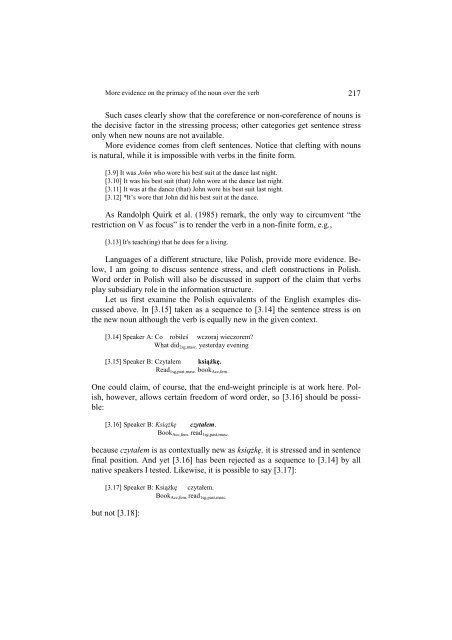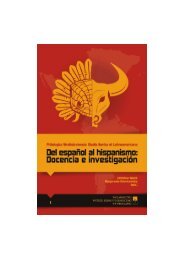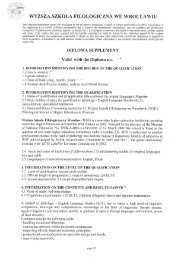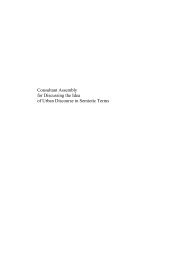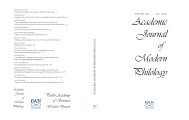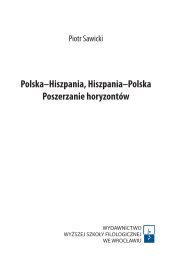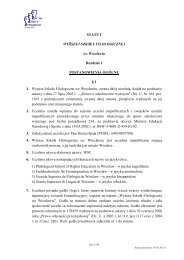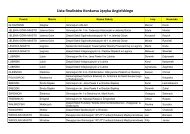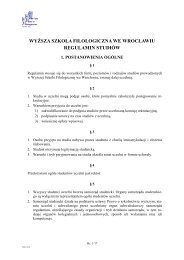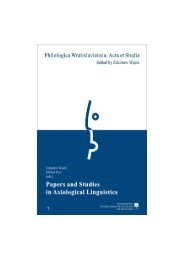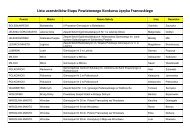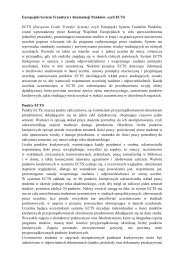s - Wyższa SzkoÅa Filologiczna we WrocÅawiu
s - Wyższa SzkoÅa Filologiczna we WrocÅawiu
s - Wyższa SzkoÅa Filologiczna we WrocÅawiu
You also want an ePaper? Increase the reach of your titles
YUMPU automatically turns print PDFs into web optimized ePapers that Google loves.
More evidence on the primacy of the noun over the verb 217<br />
Such cases clearly show that the coreference or non-coreference of nouns is<br />
the decisive factor in the stressing process; other categories get sentence stress<br />
only when new nouns are not available.<br />
More evidence comes from cleft sentences. Notice that clefting with nouns<br />
is natural, while it is impossible with verbs in the finite form.<br />
[3.9] It was John who wore his best suit at the dance last night.<br />
[3.10] It was his best suit (that) John wore at the dance last night.<br />
[3.11] It was at the dance (that) John wore his best suit last night.<br />
[3.12] *It’s wore that John did his best suit at the dance.<br />
As Randolph Quirk et al. (1985) remark, the only way to circumvent “the<br />
restriction on V as focus” is to render the verb in a non-finite form, e.g.,<br />
[3.13] It's teach(ing) that he does for a living.<br />
Languages of a different structure, like Polish, provide more evidence. Below,<br />
I am going to discuss sentence stress, and cleft constructions in Polish.<br />
Word order in Polish will also be discussed in support of the claim that verbs<br />
play subsidiary role in the information structure.<br />
Let us first examine the Polish equivalents of the English examples discussed<br />
above. In [3.15] taken as a sequence to [3.14] the sentence stress is on<br />
the new noun although the verb is equally new in the given context.<br />
[3.14] Speaker A: Co robiłeś wczoraj wieczorem?<br />
What did 2sg,masc. yesterday evening<br />
[3.15] Speaker B: Czytałem książkę.<br />
Read 1sg,past,masc. book Acc,fem.<br />
One could claim, of course, that the end-<strong>we</strong>ight principle is at work here. Polish,<br />
ho<strong>we</strong>ver, allows certain freedom of word order, so [3.16] should be possible:<br />
[3.16] Speaker B: Książkę czytałem.<br />
Book Acc,fem. read 1sg,past,masc.<br />
because czytałem is as contextually new as książkę, it is stressed and in sentence<br />
final position. And yet [3.16] has been rejected as a sequence to [3.14] by all<br />
native speakers I tested. Likewise, it is possible to say [3.17]:<br />
[3.17] Speaker B: Książkę czytałem.<br />
Book Acc,fem. read 1sg,past,masc.<br />
but not [3.18]:


